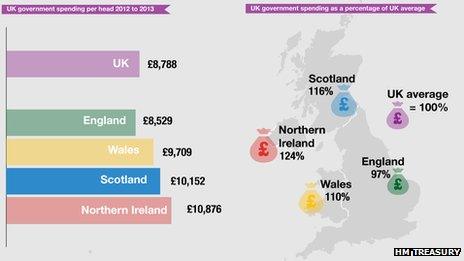Treasury: public spending in Wales 110% of UK average
- Published
- comments
Public spending in Wales is 110 per cent of the UK average, according to figures released by the Treasury today. A Treasury "infographic", external (their word, not mine) sets it out rather clearly.
Full details on the country and regional analysis are available here, external. "Identifiable public spending" in Wales (by UK and devolved governments) was £9,709 per head last year, compared to £8,529 in England (97 per cent of the UK average).
According to Treasury Chief Secretary Danny Alexander, the figures are a reminder of "a funding system within the UK that provides additional resources to Wales to meet the many needs that Welsh people have and again shows that within the UK we can strengthen Wales, we can strengthen the Welsh parliament (sic) and make sure that Wales has the funding it needs to carry on with the important work of the Welsh government."
For others, external, they will also be a reminder of how much the taxpayers of England subsidise some other parts of the UK - although supporters of Scottish independence, external argue that Scotland contributes more than it receives.
Public spending in Scotland is £10,152 per head (116% of the UK average), and in Northern Ireland £10,665 (124% of the UK average). The comparable figure for London (homework for Mr Paxman), external appears to be £9,435. There are figures on how much Londoners pay into the pot here, external.
The figures are a consequence of the Barnett formula, which the Welsh government argues short-changes it by around £300m a year. It doesn't want tax-raising powers until what it sees as that unfairness is corrected.

UK government spending by country
Asked about criticism of the Barnett formula, Mr Alexander said: "We've put in place last year a new arrangement between the UK government and the Welsh government to look at public spending at every spending round. I've worked very closely with Jane Hutt, the excellent finance minister in Wales, to do a review of whether so-called convergence is taking place, in other words, are the spending totals for Wales and the rest of the UK coming closer together.
"That's not happening right now because public expenditure is constrained and that will be the case for quite a few more years but when it does re-assert itself we've got a process to identify that and agree action to take. I think that should give people in Wales some confidence that the UK government recognises the importance of making sure that Wales has a fair funding settlement and these figures today show that Wales does well out of being part of one United Kingdom."
Separately, there's another call today for the Barnett formula to be changed, with English councils arguing that it short changes them by £4.1 billion a year. The Local Government Association, external believes the offer to Wales of tax-raising powers shifts the debate on spending and the LGA is working on an alternative formula.
"The move toward greater devolution and tax raising powers for Scotland and Wales means that this costly historical anomaly has to be addressed as a matter of urgency. It will only become more difficult to fix as the tax regime becomes more complex. The major political parties should all make the introduction of a needs-based formula a cornerstone of their pre-election manifestos and the chancellor should look to lay the groundwork."
In opposition, George Osborne did notice criticism of the formula, external - described as "an unexploded bomb under devolution", external here - but no chancellor is going to change a calculation that appears to benefit Scotland before the Scots have their say on independence.